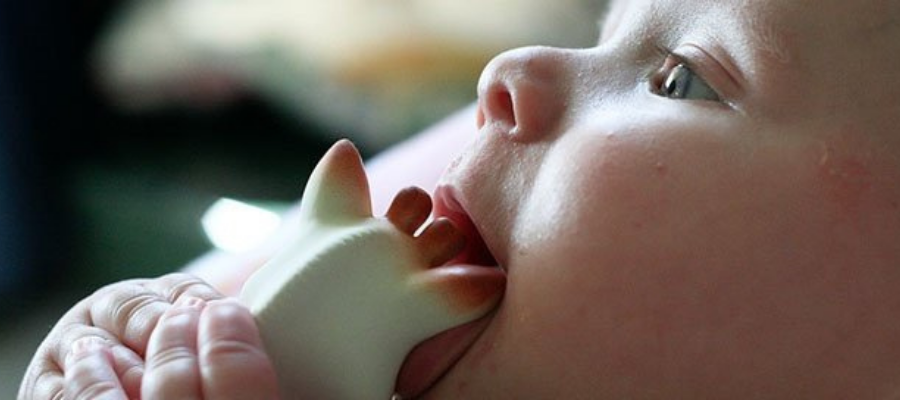Teething is a normal part of every baby’s development. But it’s so hard to watch your little one suffering through it! There are a few things you can do to make the whole process a bit less miserable. Here are some of the basics about teething and tips to make it more comfortable for baby (and for you!).
When Does Teething Begin?
The start of teething can vary widely from one baby to the next. Children in the same family will generally start teething around the same time—which is often similar to when you did as a baby. According to the Mayo Clinic, six months is about the average age, though teething can start as early as 3 months. The bottom two teeth in the middle will usually appear first, followed by the two top teeth.

Common Signs of Teething
“Teething” is often used as a catch-all cause for many uncomfortable baby behaviors in the middle of the first year of life. But it’s not always to blame. Here are some of the most common symptoms that can be attributed to teething:
- Most babies have excessive drooling during the teething stage. Many also have a lingering cough due to the large amounts of saliva their bodies are producing.
- Rash around the mouth or chin, often a result of the drool drying out the skin. This is one symptom that can also have other causes, so it’s important to look at other symptoms and the bigger picture.
- Sore gums. Most babies who are teething have sore or tender gums where the teeth are starting to poke through the skin. That’s why you’ll see them trying to shove anything into the spot in their mouths where the next teeth are ready to surface.
- Fussiness or irritability. Like the rash, this symptom can also have other causes. If your baby is abnormally grumpy but isn’t showing other signs of teething, you may want to get her checked out.
- Ear pulling or cheek rubbing. When other signs of teething are also present, ear pulling or cheek rubbing happens when the pain in their gums travels to the eardrums and jaws.
- Refusal to eat or drink. If you’ve noticed that your baby’s appetite seems off, it could be due to the pain your little one is experiencing.
Many parents believe that teething causes diarrhea and fevers, but it hasn’t been proven that this is caused by teething itself. Keep an eye on your baby’s temperature with your Kinsa smart thermometer. Fever over 100.4 degrees Fahrenheit is more likely caused by an illness and should be checked out by a doctor.
Teething Relief that Actually Works
Fortunately, many of the common discomforts associated with teething are easy to soothe. Teething babies feel better when there’s pressure on their gums, which you can help provide with cold foods (like applesauce or fruit), a washcloth, or even your clean finger in their mouth.
Give your baby lots of cuddles and emotional support. Teething is uncomfortable for your baby and it might disrupt everyone’s sleep, but it’s not a medical problem. Note that you may see bluish spots in your baby’s gums. Don’t panic - these are a normal sign that teeth are about to break through the skin.
Over-the-counter medication can also help to take the edge off the pain if needed. Learn more about safe medication options here: Baby Medicine Cabinet Must Haves
Remedies to Avoid
There’s a lot of advice on remedies for teething pain out there. We know to avoid the advice of our grandparents to rub some whiskey on the baby’s gums (even though that was once a common treatment!). But many of today’s alternative teething treatments can be just as harmful.
Use caution with homeopathic “teething tablets” sold over the counter as well, since many contain ingredients that can cause heart damage. Avoid topical teething medications that have numbing agents like benzocaine, as these medicines can lead to dangerous imbalances in baby’s oxygen levels. Amber necklaces are popular but may also be harmful.
Teething is an uncomfortable but short-lived part of infancy. As soon as your baby’s first teeth erupt, you can move on to the next exciting phase - introducing solid foods!
This post was written by Holly Case, a mom of three boys who lives in Texas. Learning how to care for her own kids was the start of a career in writing about parenting and health.










